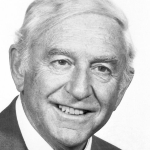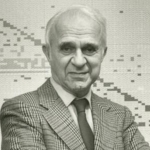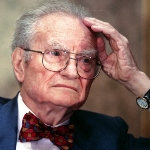Background
Robert Merton Solow was born on August 23, 1924, in Brooklyn, New York, United States. He is a son of Milton and Hannah Gertrude Solow. He had two younger sisters.

Robert Merton Solow was born on August 23, 1924, in Brooklyn, New York, United States. He is a son of Milton and Hannah Gertrude Solow. He had two younger sisters.
In 1947 Robert Merton Solow received a Bachelor of Arts degree from Harvard University, a Master of Arts degree in 1949 and a Doctor of Philosophy degree in 1951.
From 1949 to 1958 Robert Merton Solow was an assistant professor in the economics department at the Massachusetts Institute of Technology (MIT), a professor of economics from 1958 to 1973 and the Institute Professor from 1973 to 1995. In 1995 he became the Institute Professor Emeritus. From 1961 to 1962 he served as a senior staff economist on President Kennedy’s Council of Economic Advisors.
In 1964 he was a president of Econometric Society. In 1970 he served as a vice president of the American Academy of Arts and Sciences and a president in 1979. From 1974 to 1980 Solow was a member and chairman of the board of directors of the Federal Reserve Bank of Boston.
Most of his works and theories are based on the theory of economic growth, topic that he has studied and analyzed thoroughly. In 1987 he was awarded the Nobel Prize in Economic Sciences, for his works on economic growth.
In the Solow–Swan growth model, he determines long term economic growth using productivity, capital accumulation, population growth, and technological progress, as main variables. Solow sustains in his paper "A Contribution to the Theory of Economic Growth", that savings play a key role in economic growth, both as a positive factor since it allows further investment, but also as a negative issue since it can diminish the welfare of economic agents by diminishing consumption.
Robert Merton Solow is widely regarded as one of the greatest living economists. He has conducted path-breaking work in both microeconomics and macroeconomics. Solow is also the best-selling author of numerous publications.
In 1987 he was awarded the Nobel Prize in Economic Sciences "for his contributions to the theory of economic growth." He developed a mathematical model illustrating how various factors can contribute to sustained national economic growth. It is called the Solow–Swan neo-classical growth model.
(Providing illuminating profiles of ninety of the world’s ...)
2020(In Monopolistic Competition and Macroeconomic Theory, Pro...)
1998(Nobel Laureate Robert Solow explores how changes in socia...)
1992(The Nobel Prize-winning economist Robert Solow directs hi...)
1998Robert Merton Solow is not a religious person.
Robert Merton Solow is the co-founder of the Cournot Foundation and the Cournot Centre. The Cournot Foundation is a a non-profit organization, which involved in financing postdoctoral programs, creating co-disciplinary chairs and organizing sabbaticals for famous researchers. The Cournot Centre is an independent French-based research institute. It is supported by the Cournot Foundation, which operates under the Fondation de France.
Quotations: "It is a good idea to be ambitious, to have goals, to want to be good at what you do, but it is a terrible mistake to let drive and ambition get in the way of treating people with kindness and decency. The point is not that they will then be nice to you. It is that you will feel better about yourself."
Robert Merton Solow is a member of the American Economic Association and the Council of the National Academy of Sciences.
On August 19, 1945, Robert Merton Solow married Barbara Muriel Lewis, an economic historian. They have three children: John, Andrew, Katherine. She died in 2014.


